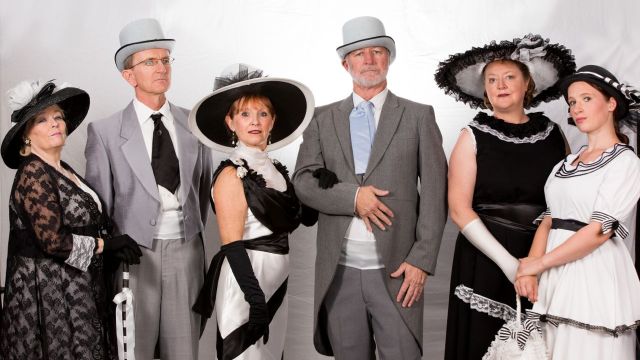My Fair Lady
My Fair Lady was PRIMA’s second production in its 10th anniversary celebration, and whilst it did not reach the giddy heights of its Hairspray predecessor earlier in the year Penny Farrow’s production did manage to implant a little of the magic of Lerner and Loewe’s masterpiece onto the Redcliffe Cultural Centre stage.
My Fair Lady is not an easy musical to stage and not an easy musical to get right. Whilst several of its songs are classics, it has few ensemble numbers and no duets to break up a series of solo showpieces.
More than most musicals it also requires performers who can not only sing well, but act and deliver Lerner’s Shavian dialogue convincingly. Stacie Hobbs’ Eliza Doolittle was believable as a cockney flower-girl and even more so as a Duchess. Her voice, which has a thin upper register, was better at delivering the fiery “Just You Wait” and “Show Me” rather than the demanding high tessitura of “I Could Have Danced All Night.” Opposite her as the phonetics Professor Henry Higgins, New Zealander Jim Price captured the brusque and uncaring nature of the character and speech-sang his songs ala the original Rex Harrison interpretation. His delivery of the misogynistic “A Hymn to Him” was first-class, as was his “I’ve Grown Accustomed to her Face”.
 Shaw always maintained that in Pygmalion the Eliza and Higgins relationship was not a love story, but Lerner and Loewe’s musical version is ambiguous in that regard. It’s not a love story in the conventional Broadway sense because the characters never touch or kiss, but it is a love story. Like the King and Mrs Anna in The King and I they are two people who are in love with each other but don’t know they’re in love with each other. The problem with Eliza and Higgins in this production was there never seemed to be any emotional connection between them and consequently we did not care as much as we should have. At least showing a frisson of emotion would have been better than none.
Shaw always maintained that in Pygmalion the Eliza and Higgins relationship was not a love story, but Lerner and Loewe’s musical version is ambiguous in that regard. It’s not a love story in the conventional Broadway sense because the characters never touch or kiss, but it is a love story. Like the King and Mrs Anna in The King and I they are two people who are in love with each other but don’t know they’re in love with each other. The problem with Eliza and Higgins in this production was there never seemed to be any emotional connection between them and consequently we did not care as much as we should have. At least showing a frisson of emotion would have been better than none.
Colin Rhys-Jones was a spirited Colonel Pickering, but unfortunately momentarily lost his place in his big number, the tongue-twisting “You Did It.” The young-looking Walter Lago brought the earthiness of Doolittle grandly to light with his knock-‘em-in-the-old-Kent-Road numbers, “With a Little Bit of Luck” and “Get Me To the Church on Time”, whilst Robbie Mitchell as Freddie sang the heart out of “On the Street Where You Live”. Best performance came from PRIMA veteran Robyn Lupton as Mrs Higgins. She was a tower of strength and authoritative. The ‘downstairs’ maids in their black smocks and crisp white aprons brought a nice touch of Downton Abbey to ‘quit Professor Higgins’ and added some strong, and necessary, vocal strength to the sequence. The ensemble, well-costumed in black, white and grey, also excelled in the “Ascot Gavotte.”
Conductor Julie Whiting’s musical cues were spot-on and the band, which swapped a keyboard for strings, solved the problem of screechy violins but unfortunately gave an electronic feel to the orchestra which did not sit comfortably with Lerner and Loewe’s traditional score.
Peter Pinne
Subscribe to our E-Newsletter, buy our latest print edition or find a Performing Arts book at Book Nook.

